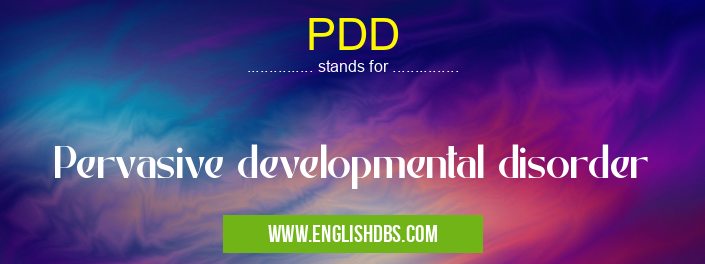What does PDD mean in PEDIATRIC
Pervasive developmental disorder (PDD) is a set of mental disorders that includes autism, Asperger’s syndrome and other similar conditions that affect communication skills, social interaction, and behavior. People with PDD experience difficulties in expressing emotions, forming relationships, understanding conversations and connecting with others. PDDs also typically include delayed development in speech, language and motor skills such as walking.

PDD meaning in Pediatric in Medical
PDD mostly used in an acronym Pediatric in Category Medical that means Pervasive developmental disorder
Shorthand: PDD,
Full Form: Pervasive developmental disorder
For more information of "Pervasive developmental disorder", see the section below.
What is PDD?
PDD is a term used to describe the difficulties experienced by individuals who have a broad range of mental health problems related to communication, socialisation and behaviour. Individuals with PDD can have difficulty making friends, speaking in public or taking part in activities that involve interaction with others. They may also have difficulty regulating their emotions and be prone to tantrums or outbursts when they are overwhelmed or frustrated. Common characteristics associated with PDDs can include repetitive behaviours, narrow interests, intense focus on one activity or topic for long periods of time and difficulties with transitioning from one task to another.
Treatment & Diagnosis
Treatment for PDDs can involve a variety of approaches including cognitive-behavioural therapy (CBT), supportive counselling and family therapy. Early intervention services are important for helping diagnose and treat PDDs as soon as possible so that children can learn the necessary skills needed for school and life success. In addition to psychological therapies, medications may be prescribed for managing certain symptoms such as anxiety and depression. It is important to work closely with a doctor or psychologist who specialises in diagnosing and treating persons with developmental disorders to ensure accurate diagnosis and effective treatment of the condition.
Essential Questions and Answers on Pervasive developmental disorder in "MEDICAL»PEDIATRIC"
What is Pervasive Developmental Disorder (PDD)?
Pervasive Developmental Disorder (PDD) is a term used to describe a group of five neurodevelopmental disorders that are characterized by delays in the development of social and communication skills. These include Autistic Disorder, Asperger Syndrome, Rett Syndrome, Childhood Disintegrative Disorder and Pervasive Developmental Disorder - not otherwise specified.
How common is PDD?
According to the Centers for Disease Control and Prevention, approximately 1 in 54 children in the United States have been identified with autism spectrum disorder (ASD).
What are some common signs of PDD?
Some common signs of PDD include difficulty communicating verbally or non-verbally, difficulty making eye contact, poor social interactions, difficulty understanding others’ emotions or intentions, and repetitive behaviors.
What should I do if I think my child has PDD?
If you suspect your child may have PDD, it is important to seek an evaluation from a professional with experience diagnosing and treating these disorders. A developmental pediatrician or pediatric neurologist can assess your child’s development and help make an appropriate diagnosis.
Is there a cure for PDD?
At this time there is no known “cure” for any form of Autism Spectrum Disorder, including PDD. However, research has shown that early intervention can greatly improve outcomes for children with autism spectrum disorders. Early identification followed by treatment can lead to improved communication skills and behavior management strategies which can lead to a better quality of life.
What types of treatments are available for someone who has been diagnosed with PDD?
Treatment plans will vary depending on the individual needs of each person diagnosed with PDD as well as their families’ goals for success. Common treatments include behavioral therapies such as applied behavior analysis (ABA), speech therapy, occupational therapy, sensory integration therapy, medications such as SSRIs or other psychotropic drugs which may be prescribed to address anxiety or depression associated with ASD symptoms, social skills groups/therapy and more.
Are there support groups available for people affected by PDD?
Many organizations such as Autism Speaks offer support programs both online and in person specifically designed to help those affected by autism spectrum disorder meet their goals. It is also beneficial to connect with other families affected by ASD in order to share resources and provide emotional support during the challenging times associated with raising a child with ASD.
How can I best communicate with someone who has been diagnosed with PDD?
When communicating with individuals who have been diagnosed with a form of Autism Spectrum Disorder it is important to be aware that they may process information differently due to their neurological differences. It helps if you choose language carefully when speaking so that they understand what you are saying without feeling overwhelmed or confused. Additionally, providing concrete examples rather than abstract concepts can also be helpful when trying to explain something complicated.
Does diet play an important role in managing symptoms associated with PDD?
Research has found that diet plays an important role in managing symptoms associated with ASD such as anxiety, aggression and hyperactivity. Adopting anti-inflammatory diets like the ketogenic diet or gluten-free diets could potentially reduce symptoms related to ASD.
Final Words:
Pervasive developmental disorder is a general term used to describe several mental health conditions related to communication, socialization an behaviour which require early intervention services for accurate diagnosis and treatment. People living with PDDs often require tailored psychological therapies combined with medication management depending on individual needs/symptoms experienced; all aiming towards providing individuals with improved quality of life over time.
